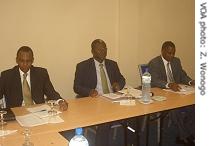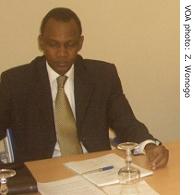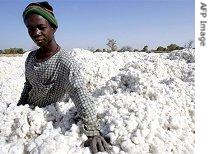2007年VOA标准英语-West Africa's Cotton Countries Impatient for Do(在线收听)
Dakar
06 September 2007
As trade negotiators meet in Geneva on the stalled negotiations known as the Doha round, government ministers from West Africa's biggest cotton producing countries met in Burkina Faso to prepare their demands on a Doha deal. Phuong Tran has more from VOA's West Africa bureau in Dakar.
 |
| Choguel Maiga, Malian Minister of Commerce (far left person), Ouagadougou, 06 Sept 2007 |
Cotton officials from Chad, Mali, Benin and Burkina Faso met to renew their campaign against foreign agricultural subsidies they say hurt their farmers and lower global cotton prices.
Burkina Faso's representative to the World Trade Organization, Moussa Niebe, says Africans are not looking for favors from rich trade partners.
"This is really a problem of justice," Nebie said. We are just asking them to respect the rules of international trade, the rules of the WTO [World Trade Organization], the rules of the free market. "
Analysts say West Africa's cotton sector is near bankruptcy not only because of stalled trade talks. They point to weather, poor technology and competition from chemical fibers.
 |
| Choguel Maiga |
Maiga says the harm to American farmers from cutting subsidies would not be as great as the harm those subsidies currently cause West Africans, who he says are dependent on cotton revenue.
The International Cotton Advisory Committee, an association of 44 cotton producing countries, says up to 15 million West Africans are dependent on cotton farming.
The minister adds that even though it will be difficult for the U.S. government to cut subsidies because of the strong American cotton lobby, he says the U.S. must comply with international trade laws.

A Burkinabese farmer stands by cotton bolls in Pama, central Burkina Faso, 22 Jan 2007
The United States has already agreed to cut major cotton subsidies by more than half to $22.5 billion a year as a result of a case brought by Brazil in the World Trade Organization.
But the cut will not be fully implemented for another six years. The World Trade Organization is expected to issue a ruling later this year on whether the United States has done enough to comply.
The trade negotiations in Geneva are expected to last until the end of the month.
The Doha round is named for the capital of Qatar, where the talks began in 2001.